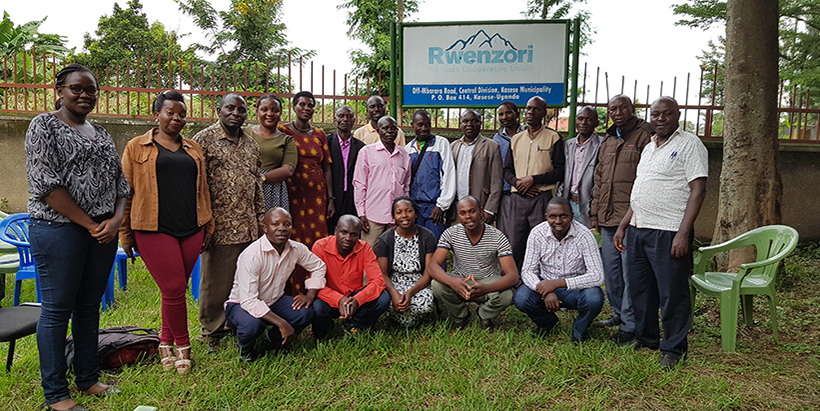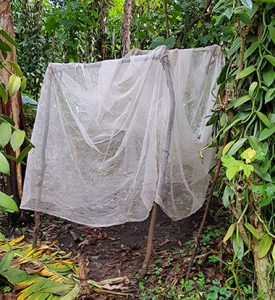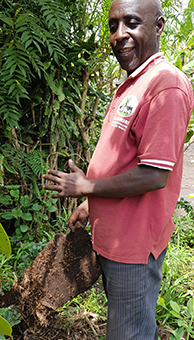The International Institute of Tropical Agriculture (IITA) in collaboration with Catholic Relief Services (CSR) with support from the Sustainable Food Lab (SFL) is conducting a baseline assessment on the level of coffee and vanilla diversification among smallholder farmers in the South Western and Central districts of Uganda that is Kasese and Buikwe districts, respectively.

Group photo of RFCU farmer group representatives, RFCU management, and IITA staff after a consultative meeting. Photo credit: RFCU
The IITA research will explore diversification options, and climate-change-related challenges across selected farmers in Kasese District. The recommendations from this research are intended to inform further dialogue with the private sector on the potential for expansion of coffee and vanilla production in Uganda using innovative approaches to effective farm diversification. Through existing CRS partnerships in the area, IITA is conducting research with members of the Rwenzori Farmers Cooperative Union (RFCU) – http://mtrwenzoricoffeefarmers.org/
Farmers in South Western Uganda think of vanilla as their “green gold” because of the numerous benefits—specifically, the increased finances in their households as a result of the income boost from vanilla sales. However, uptake of vanilla remains considerably low despite the crop’s great economic potential. Why is this?

This is one of many similar structures that the men spend nights in, guarding their vanilla farms. Photo credit: Faith A. Okiror- IITA
James Baluku, one of the vanilla farmers in Rwimi sub-county of Buyangabo District, South Western Uganda says he has not harvested any vanilla from his farm for the past 3 harvest seasons due to theft. “It has always been stolen!” he exclaims. He adds that each harvest season that is June/July and December/January, the vanilla is stolen before maturity. Unfortunately, the police have not been of help. Many farmers have resorted to spending nights in the farms and setting up traps within their farms to alert them when a thief enters the farm. Local traps include plastic bottles placed in strategic places that alert the farmer of any intruder. Other locally made traps include nails on a wooden log that pierce the feet of the intruder. These are concealed with mulch. Because the men spend many nights in vanilla gardens, vanilla is now being referred to as a “family planning” method. The wealthier farmers can afford to hire armed security guards to protect the precious green gold. We received similar reports from farmers in Gatyanga, Kadindimo, and Rwimi; the three sub-counties visited by the IITA team in June 2019.

A vanilla farmer in Rwimi sub-county shows off one of the traps in his farm. Photo credit: Faith A. Okiror- IITA
Coffee and vanilla are grown in several districts in South Western Uganda including Kabarole, Kasese, Bundibugyo, Bunyangabo, and Ntoroko. RFCU has 3200 registered farmers across the region. The average landholding size for vanilla is 1 acre. The farmers have several crops on their land including coffee, vanilla, cocoa, and banana. However, for food security, farmers often hire land to grow their seasonal food crops.
Coffee and vanilla farmers interviewed by the IITA researchers expressed a need for government to give priority to vanilla and develop an enabling environment with relevant national policies and district bi-laws governing production, postharvest handling, marketing, and sale of vanilla. To kickstart the process, IITA conducted consultative meetings with impact partners in both districts to establish the state of coffee and vanilla diversification in the two districts. This is the first of several activities anticipated under this research project.


No Comments